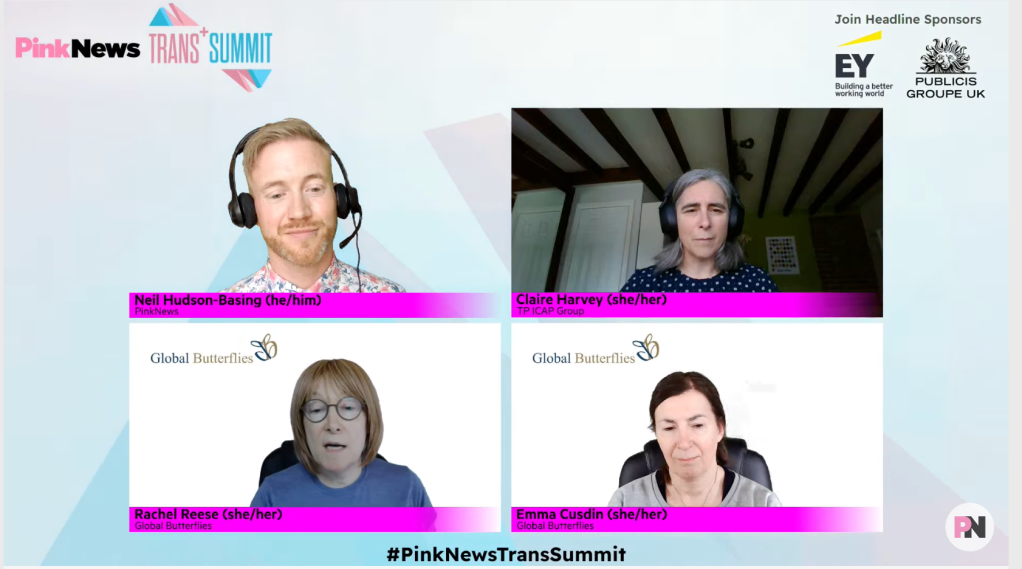Managers urged to be a ‘force for allyship’ for trans and non-binary people at work

The PinkNews Trans+ Summit saw inclusion experts to talk about the importance of managers being allies for the trans and non-binary people. (Getty Images/PinkNews)
The PinkNews Trans+ Summit saw inclusion experts to talk about the importance of managers being allies for the trans and non-binary people. (Getty Images/PinkNews)
As the trans and non-binary community continue to be thrown under the bus in mainstream media and used as a political football by the UK government, the case for allyship and inclusion is more important than ever – including for workplace managers.
During last Thursday’s (11 May) PinkNews Trans+ Summit – which brought together business leaders, inclusion experts and trans activists – a session was dedicated to highlighting the ways managers can best support their trans and non-binary employees.
The session was hosted by Neil Hudson-Basing, senior events and communities manager at PinkNews, who was joined by Global Butterflies directors Emma Cusdin and Rachel Reese, along with Claire Harvey, head of inclusion, wellbeing and engagement at TP ICAP.
“Cast that positive leadership shadow to build that psychological safety.”
Emma Cusdin, director at Global Butterflies
The panel highlighted the crucial role managers play in creating a positive environment that allows everyone to be themselves. By being a force for allyship, managers can positively impact the organisation’s reputation and attract talented individuals from diverse backgrounds.
“Being a manager isn’t easy. You can be a force for allyship or not,” Cusdin said. “For trans and non-binary people, having a leader that supports them, then they can be themselves.”
Cusdin pointed to stats that show that 65 per cent of trans and non-binary people aren’t out at work, with lack of psychological safety and trust at work offering an explanation.
She added that the purpose of Global Butterflies’ workshops for managers is to educate but also “to really cast that positive leadership shadow to build that psychological safety.”
For Harvey, there is both a business and moral case to having managers that are educated. “We wanted to be absolutely sure that our managers are really well equipped to create the right environment that trans and non-binary people can absolutely be themselves,” she stated.
“The moral side of it is that I’m a member of the LGBT+ community,” she continued. “I’m very lucky and privileged to have a lot of trans and non-binary friends. I know how difficult it is to ask people to trust that an organisation is inclusive without being able to categorically say, this is what we’ve done to make it happen.”

Reese mentioned that overall, kindness has often showed itself where she didn’t think there would be any – and that is in part due to her own prejudices.
“I went to a manufacturing plant where people were hitting things with hammers and somebody was transitioning on the floor shop floor, and I thought, wow, they’re gonna have a tough time,” she recalled.
“We went in and did some training and the manager there shone their light down and said “We are going to this and it is going to be great.” The person came back and started their role and it was a great experience.”
“For me, leadership and inclusion are intrinsically the same thing.”
Claire Harvey, head of inclusion, wellbeing and engagement at TP ICAP
The panel then took on the concept of allyship and what that looks like from a managerial perspective. Cusdin mentioned that the word allyship is a “doing” word and everyone can be an ally in their own way – but silence is not a path towards allyship.
“If you see things or hear things that are transphobic, homophobic or biphobic, step in and don’t remain silent,” she said. “Because your silence is condoning what’s just happened.”
Reese agreed and encouraged the audience to reach out to their trans and non-binary colleagues, especially as the attacks on the community have ramped up in the last three years.
“You cannot be blind to the negative media and politics that are going on right now for trans and non-binary people,” she continued. “You should be checking in on them and letting them speak.”
For Harvey, good allyship is good leadership. “For me, leadership and inclusion are intrinsically the same thing,” she said. “Inclusion is about how you do your leadership.”
She also noted that good allyship also involves being clumsy at times: “Sometimes getting the wrong language is always better than not having the conversation at all.”
“This is the time we need you to be noisy. So be noisy.”
Rachel Reese, chief executive at Global Butterflies
To conclude the session, Hudson-Basing asked the panellists what their hopes are for the future of trans inclusion and allyship in the workplace.
Cusdin expressed her hope that all managers remember that being an ally is an action, not a description. “Just share one thing you’ve learned from today,” she said. “Share it with one other person and be willing to step into the conversation.”
For Harvey, her hope is that the issues that trans and non-binary people face at work will no longer exist – and that the biggest angst in their lives will be “what am I going to have for lunch today?”
Rachel Reese, CEO at Global Butterflies wrapped up the session with a reminder to all business leaders that “a lot of organisations that were happy-clappy about trans and non-binary people have gone very quiet.”
She added: “And this is the time we need you to be noisy. So be noisy.”

